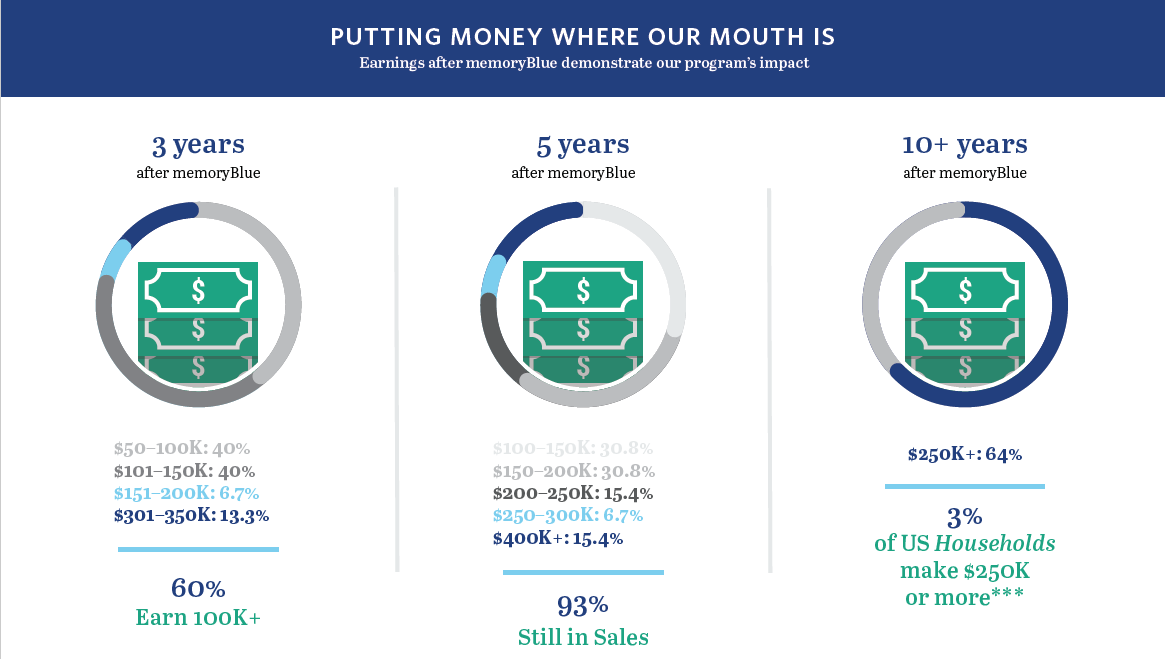— May 29, 2019

Money is one of the most powerful things in the world.
Most want it and even more don’t think they have enough of it. As the popularity of launching a sales career (“The 10 Most Popular Jobs for Recent College Graduates Right Now” – Money, May 2019) continues to rise, brand-new college graduates often find entry-level sales job offers in abundance.
The first professional step for these individuals is typically landing a role as a Sales Development Representative or SDR. This is the role where new sales pros cut their teeth, learn the trade craft of sales and start to blaze a path in a competitive world.
Faced with competing offers for their services, new or soon-to-be college graduates must sort through a variety of factors in order to make the best initial career choice. And despite access to a wealth of resources that can help properly vet such a decision, it’s all too easy to view this first move as simply a bidding war from the employers. There are a lot of new living expenses that need to be covered and it’s highly likely that student loan debt is looming.
Taking the offer that has the highest base salary may seem like an easy decision in this moment. Make more money right now, give yourself the best possible initial lifestyle and start from the highest platform possible in order to raise the ceiling on future compensation.
Unfortunately, reality can get in the way of fantasy.
Patience (Not Patients) is a Virtue
Taking a higher-paying entry-level sales job may allow for a slightly easier life in the short term, but it can impact earnings in the long term. As we’ve covered on this blog in the past, new job seekers aiming for a professional sales career need to strongly consider where they want to end up before they get started. And, this may very well mean sacrificing some near-term dollars to get there.
But this advice isn’t confined to the sales world. In fact, it’s commonly accepted in careers all around us. To prove it, let’s take a close look at what another future, well-respected professional must give up in order to achieve a phenomenal set of earnings later.
According to US News & World Report’s “2019 Best Job Rankings,” the highest paying jobs in the United States are almost all physician-based jobs. The average annual salary of a doctor is $ 195,842. That isn’t tough to imagine and it doesn’t feel unfair. Isn’t strong compensation warranted for people who go through what it takes to become physicians?
 Doctors endure nearly a decade of higher-education, countless days of impossibly long hours grinding through residencies, long weeks, short (or non-existent) weekends and very little work/life balance. And they do all of this before they even make it to the first true stop in their profession.
Doctors endure nearly a decade of higher-education, countless days of impossibly long hours grinding through residencies, long weeks, short (or non-existent) weekends and very little work/life balance. And they do all of this before they even make it to the first true stop in their profession.
Strip away the common sense thought that more schooling equals more money and look at what a person becoming a doctor had to give up. Most can’t fathom doing this and even more wouldn’t have the chops to do it even if they were willing to try. This creates scarcity in the role – and scarcity drives up compensation.
Future doctors must give up thousands of dollars of their own personal money just to become a doctor. The average amount of student loan debt a doctor has when they leave school is $ 196,520 according to nerdwallet. Instead of exiting the higher education years with $ 28,446 in debt (the average amount of student loan debt people with a bachelor’s degree leave school with) and earning a salary right away, an aspiring doctor will attend school for four more years before spending, at least, another three to seven years earning their residency.
In the end, that is about a ten-year gap between a doctor earning a large enough paycheck to start tackling that debt compared to a student with an undergraduate degree earning a paycheck right away.
And we’re not even discussing the mental obstacle-filled road that exists on the path to becoming a doctor. These are very bright, top-of-their-class individuals. They will hear tales of friends and peers doing well financially right away. Imagine the temptation they will face to quit and do something more lucrative in the near-term as they grind out their education and residency time periods.
These strong-willed, career-minded pros are deferring near-term rewards for powerful long-term gain.
Shunning the Quick and Easy
For business professionals, and especially for sales pros, years and years of schooling isn’t a necessity for earning a larger salary in the long term. What is a necessity for earning a higher paycheck is evaluating entry-level offers without obsessing over how much money that job will pay you in the moment.
Instead, focus solely on how the specific opportunity allows for growth and future success as a professional.
Two personality traits that must be present if a person is going to become a doctor is patience and an ability to see the bigger picture. Future doctors are going to go into debt, but with patience and the ability to see the larger picture, they will eventually make more money than most.
At memoryBlue, we look for sales professionals with those same personality traits. Professional sales isn’t easy, and the first few years are very tough to navigate. There will be opportunities to give up when the going gets tough. It takes a special individual to see the long-term possibilities, set goals, maintain an achievement-oriented mindset and allow nothing to stand in the way of success.
But there are big rewards for sales professionals who can do this – if they pick the right starting spot.
Our alumni offer an immediate example for every new hire at memoryBlue around the power of deferred rewards and the validity of their choice to start out with us. More than 70% of the sales pros who launched a career with us have earned $ 150,000 or more within 5 years of leaving our program. And 10 years after joining our alumni group, 64% of these sales pros have banked over $ 250,000 in a single year.
 The payoff is massive, but many of these individuals may not have selected memoryBlue as a first job if the decision was purely made based on entry-level base salary alone.
The payoff is massive, but many of these individuals may not have selected memoryBlue as a first job if the decision was purely made based on entry-level base salary alone.
Our comprehensive training program plays a big role in helping new SDRs look at the big picture. Along with world-class instruction in sales fundamentals and principles, every memoryBlue new hire is exposed to the strong future they very realistically can achieve in professional high-tech sales. In addition to this training, new hires build a massive professional network through us while gaining exposure to our wide range of clients, who are leaders in nearly every industry and space within high-tech.
Staying away from easy short-term rewards isn’t for everyone. Many people will take a small gain right in front of them, feeling like the promises of a brighter tomorrow are too intangible to consider. That’s instant gratification, and it can feel good for a second.
Business & Finance Articles on Business 2 Community
(58)





